Hot Pack Ground Beef How Much Per Pint
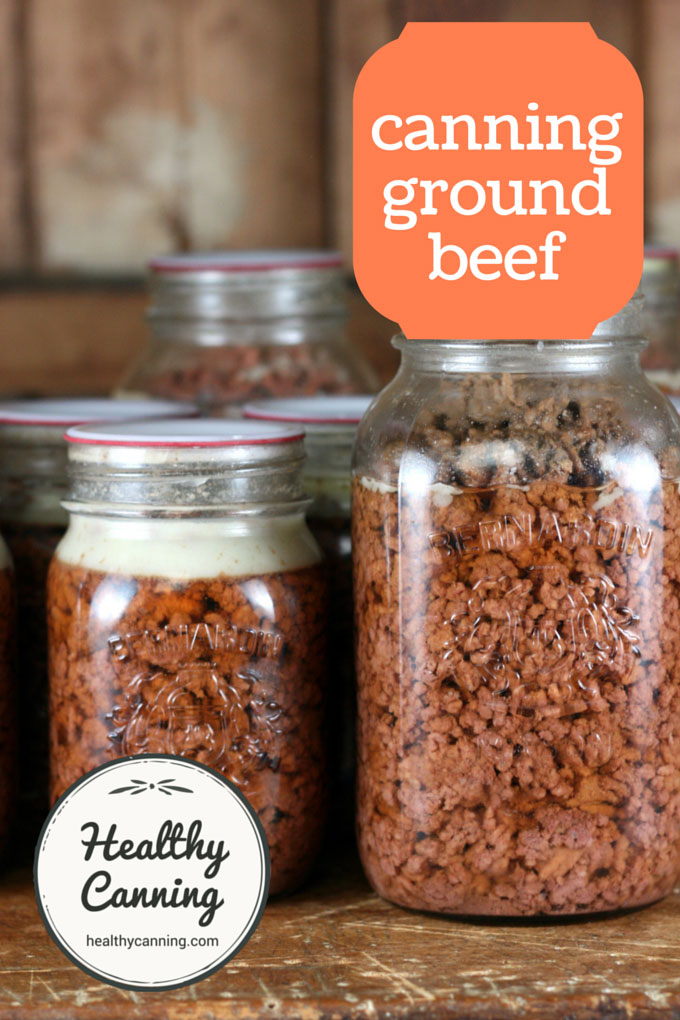
Home canned ground beef is great to have on hand to make tacos from or to add to stir-fried rice, casseroles, creamed sauces, noodle dishes, chili, etc.
Freeze the broth from the jar; it's essentially pure beef stock and is great for soups.
Here, we work through the USDA's directions.
Please note: dry-canning any ground meat is expressly recommended against by the National Center for Home Food preservation for safety reasons.
See also: canning ground pork, and, can ground poultry be home canned?
- 1 Quantities of ground beef needed
- 2 The recipe
- 3 Pressure canning ground beef
- 3.1 Ingredients
- 3.2 Instructions
- 4 Recipe notes
- 5 Reference information
- 6 Recipe source
- 7 Nutrition
- 8 Do you have to use liquid in the jar?
- 9 Enhancing the taste
- 10 Usage notes
- 11 Cooking from canning recipes
Quantities of ground beef needed
On average, as a very rough guideline, expect to need about 500 g (1 lb) of ground beef per half-litre (US pint) jar of canned ground beef.
The recipe
Jar size choices: Either half-litre (1 US pint) OR 1 litre (1 US quart)
Processing method: Pressure canning only
Yield: varies
Headspace: 3 cm (1 inch)
Processing pressure: 10 lbs (69 kPa) weighted gauge, 11 lbs (76 kpa) dial gauge (adjust pressure for your altitude when over 300 metres / 1000 feet)
Processing time: Half-litres (pints) 75 minutes; litres (quarts) 90 minutes

Pressure canning ground beef
How to home pressure can ground beef
Prep Time 1 hour
Cook Time 1 hour 30 minutes
Total Time 2 hours 30 minutes
Yield 1 varies
Calories 143 kcal
- ground beef
- water
- pickling salt (optional)
-
Spray a skillet with cooking spray or heat a small amount of fat or oil in it.
-
Brown the ground meat in the skillet in batches; transfer the browned meat to a covered bowl or pot to keep hot.
-
Pack meat loosely into half-litre (1 US pint) OR 1 litre (1 US quart) jars.
-
Leave 3 cm (1 inch) headspace.
-
[Optional]: add ½ teaspoon pickling salt to half-litre (1 US pint) jars; 1 teaspoon of pickling salt to 1 litre (1 US quart) jars.
-
Top jars up with a boiling liquid (water from a kettle, meat, stock, or tomato juice) maintaining 3 cm (1 inch) headspace.
-
Debubble; adjust headspace.
-
Wipe jar rims.
-
Put lids on.
-
Processing pressure: 10 lbs (69 kPa) weighted gauge, 11 lbs (76 kpa) dial gauge (adjust pressure for your altitude when over 300 metres / 1000 feet.)
-
Processing time: half-litre (US pint) jars for 75 minutes OR 1 litre (US quart) jars for 90 minutes.
Processing guidelines below are for weighted-gauge pressure canners. See also if applicable: Dial-gauge pressures.
| Jar Size | Time | 0 to 300 m (0 - 1000 feet) pressure | Above 300 m (1000 ft) pressure | |
|---|---|---|---|---|
| ½ litre (1 US pint) | 75 mins | 10 lbs | 15 lb | |
| 1 litre (1 US quart) | 90 mins | 10 lbs | 15 lb |
Recipe notes
- The purpose of browning the meat first is so that it won't clump and form a huge solid dense mass in the year. You must brown it first; there's no option for raw packing it owing to the risk of it clumping. To be frank, the colour you will get is probably more of a greyish colour / light brown than a deep brown. That is fine. You are not looking to char the meat or sear it or blacken it or make it crispy: just lightly brown it enough so that it will largely remain loose packed in jar and allow heat flow to pass in between.
- If you have a lot of ground meat to brown, you could bake in a hot oven until lightly brown. Use a high-sided baking pan / tray (lined with tin foil for easier cleanup, if desired), and scatter the ground meat evenly over the tray. Bake at around 175 C / 350 F, probably for 20 to 30 minutes depending how hot your oven runs. Take out of oven in middle of baking to break up any large clumps, if needed. A lot of fat will accumulate in baking trays so be careful when lifting out of oven. Drain well afterward. (Tip! Put the drained-off beef fat in a tub in the fridge for roasting potatoes in. Delicious!)
- Instead of the salt, you can use a non-bitter, non-clouding salt sub. We have found Herbamare Sodium-Free performs well in that regard.
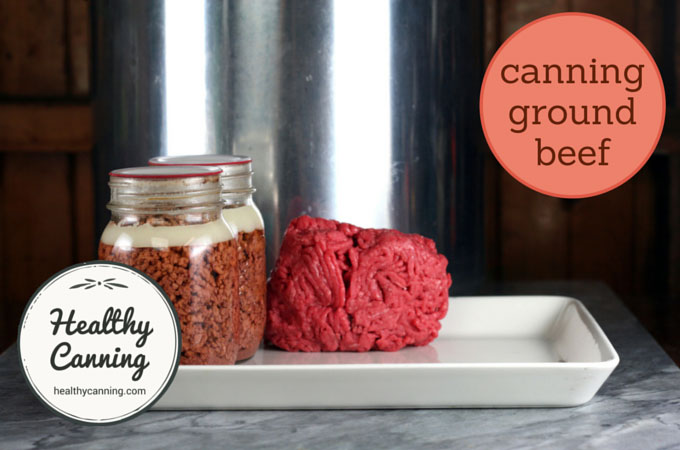
Reference information
How to pressure can.
When pressure canning, you must adjust the pressure for your altitude.
More information on canning meat.
Shelf life of home-canned goods
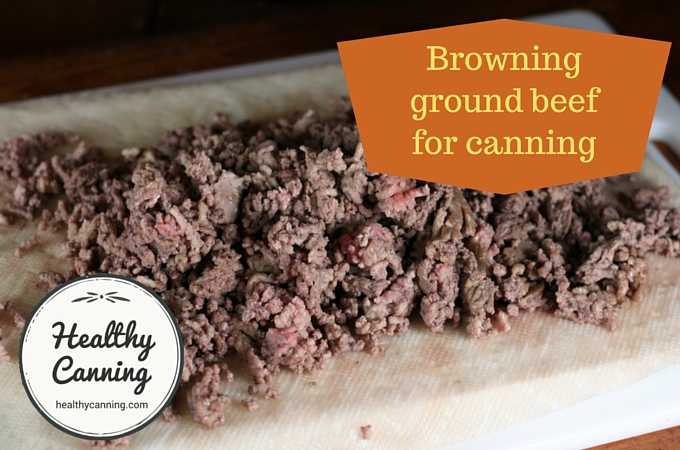
This ground beef is sufficiently browned so that it won't clump together in the jar. Browning it any further in the skillet would just toughen it, and waste cooking fuel as it will get thoroughly cooked during the canning process, anyway.
Recipe source
This recipe comes from the USDA Complete Guide.
- Ground or Chopped Meat. In: United States Department of Agriculture (USDA). Complete guide to home canning. Agriculture information bulletin No. 539. 2015. Page 5- 6.
Nutrition
Serving size: 100 g (3.5 oz), drained (about one-fifth of a ½ litre / US pint jar, if 500 g went into the jar.)
Nutritional information based on extra-lean ground beef being used.
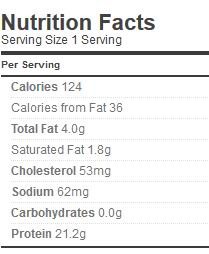
Per 100 g: 124 calories, 62 mg sodium
Weight Watchers PointsPlus®: 100 g (3.5 oz) = 3 points
* Nutrition info provided by https://caloriecount.about.com
* PointsPlus™ calculated by healthycanning.com. Not endorsed by Weight Watchers® International, Inc, which is the owner of the PointsPlus® registered trademark.
Do you have to use liquid in the jar?
Regardless of what you may see elsewhere on the Internet, there is no dry-pack option that is guaranteed to be safe. The recommendations were developed with a liquid in the jar to ensure a safe and even distribution of heat.
But it's the work of seconds to drain the jar when opening it, and you get what is fat-free and added-salt free beef stock to freeze for use in soups, stocks, gravies etc.
Enhancing the taste
Some people say that adding beef bouillon to their jars of ground beef enhances the flavour greatly. Suggested proportions of powdered beef bouillon are between ¼ and ½ teaspoon per ½ litre (pint) jar, and ½ teaspoon and 1 teaspoon per litre (quart) jar. You'll want to ensure this is mixed up before adding to the jars, to avoid density issues with clumps.
Doing so is absolutely fine safety-wise. The USDA directions allow the canning liquid to be "meat broth, tomato juice, or water."
Usage notes
If you store your jars of canned food in a cool place, when you go to use a jar of ground beef there can appear to be no water in the jar because it has solidified. Yet, you know there is water in there, because you put it in for canning. Just open the jar, tip into a microwave-safe bowl or jug, and zap in microwave for 1 minute to free up the water, then drain through a sieve. That beef broth can be added to a tub and frozen for soups, etc. (No need to drain the jar at all of course if you are using your jar of ground beef for a recipe where you would want the added liquid.)
Here's information in detail on how to do that: Using home canned ground beef.
Cooking from canning recipes
Beef Dip
Borscht
Fiesta cornbread casserole
Minnesota Mix Macaroni Hotdish
Taco Skillet
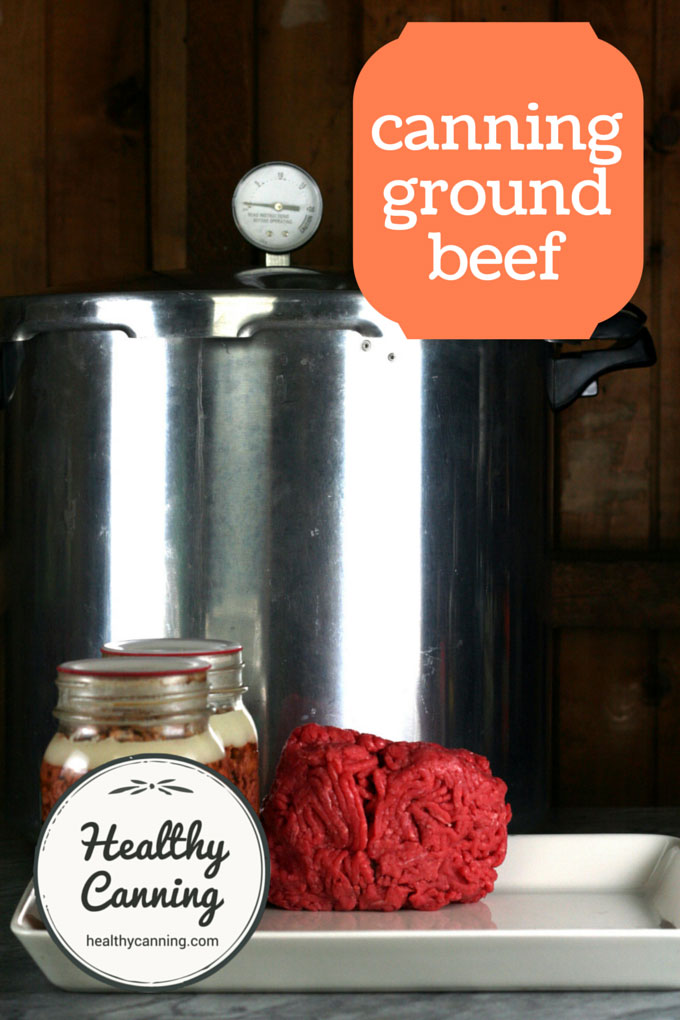
Source: https://www.healthycanning.com/canning-ground-beef
Post a Comment for "Hot Pack Ground Beef How Much Per Pint"